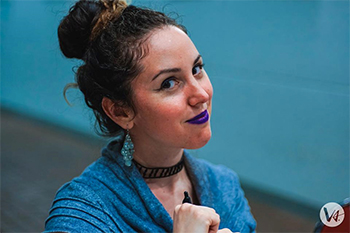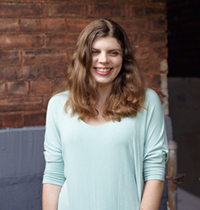In Need of Art: Jess Taylor in Conversation with Erin Kirsh

Malahat interviewer Jess Taylor recently spoke with Vancouver slam poet and Malahat author, Erin Kirsh, about her upcoming Autumn Issue #196 poem, "Attachments Anyway." In this interview, Kirsh discusses the interplay between poetry and spoken word, her relationship with Vancouver, and up-and-coming poets to discover.
Listen to Erin Kirsh's recording of her Malahat poem, "Attachments Anyway."
You're a popular slam poet, and it seems like you have particular poems that really land with your audience. How does engaging with this community factor into your writing?
Spoken word makes poetry fairly accessible, and has been helping me move from my habit of overwriting everything (Really? Do people need to know about the chair legs being slightly darker than the seat of the chair, Erin? Why are you like this?) towards a crisper minimalism, something I achieve about 20% of the time.
The spoken word community has given me more than I probably even know. It has given me new collaborators, friends, and muses. I've been introduced to so many concepts and voices I may never have found otherwise, and I can't overstate how essential having a community of artists is. I have a band of friends who understand my artistic process, whose work I get to hear and help edit, who help me edit my pieces, and who can point out when I'm indulging my bullshit. I feel like I'm always getting exclusive performances to this amazing art that so few people get to experience. They also don't let me slack on my writing.
Do you find that you have a different audience in mind whether you are writing for the page or for the stage, or are these both something you're always considering? For instance, in your poem "Attachments Anyway," which is set to appear in the Malahat's Autumn 2016 issue, the repetition and rhythm makes it something that would work well performed, but the images and language also work well for a page poem where the reader wants to look back through the poem and make connections.
I'm a selfish character, so if I'm thinking at all when I write, I'm pretty much only thinking of me. The less I think during a piece, the better I find it turns out. I like to look at a page when I'm done and think, "oh, cool, I didn't know that was in my head somewhere." Then I like to get hypercritical and edit the ever-loving fuck out of it. So that's where the consideration of audience comes in.I often end up with three or four versions of a poem.
I think most good poems can work on both page and stage if there's enough thought given to the presentation, though there are distinct and different benefits to both mediums. You can add another filter when you're performing, but it can also be hard to use complex metaphors, because like you say, the recipients of the poem can't go back and read a line and be like, "oh, hey, that was at a play on a past line." Once an audience member is lost, they're lost, and then the rest of the poem becomes a write-off to them.
This poem both seems to be a critique of Vancouver and a celebration of it. Was this what you were going for, or did you see the poem as exalting even annoyances and disappointments? Or was the poem just about letting everything go for you, acknowledging that everything that is here will one day not be?
A little bit of all of that. I have a lot of immoderate ambivalence for Vancouver, and that all came out in this poem. I aim for a sort of zen neutrality in my life, which is hilarious, because I think neuroses make up 92% of my personality. But I think one of the only ways to cope with living in Vancouver is to sort of face plant into impermanence.
Vancouver is this incredible jewel of a city, and I love it so deeply, but since I moved out here in 2008, I've seen so many little hubs—arts venues, book stores, chocolate shops, record stores, my favourite Indian food place—disappear because it's so difficult to survive here. These places were all places that felt like home, and that built community in a somewhat socially isolating city. It feels symbolic when they can't make it.
One of the things that I really like about the poem is that although it lists images, people, and experiences, there are still little stories embedded within it. Were there any experiences or images, cool stories that didn't make the cut?
Dozens. At one point this was a seven-page poem and I was like, "okay, dial it back there, Allen Ginsberg." In the images I tried to keep a balance between neighbourhoods, between natural and constructed, between cultural and social, and in the end I just cut any of the images that were at all similar to the others. It was a gentle Darwinism in this poem, only the strong survived (and also the ones I felt stupidly tender towards).
You have recently moved on from The Vancouver Poetry House. Can you tell us a bit about that experience, and some your best moments working as Executive Director there?
Working in one of the spaces that strives to provide Vancouver with a strong, accessible arts community was amazing. Vancouver is hard, and I think to survive it we need each other and we need art. One of the highlights of working with Vancouver Poetry House was co-Managing Verses Festival of Words, an 11-day, multidisciplinary literary festival with the immeasurably talented and dedicated Jillian Christmas. It was so rewarding to help create, run, and curate an event that unites the Canadian spoken word community with its unique and disparate voices, and to be able to showcase top tier writers and spoken word artists of the day.
What's the most challenging thing about writing poetry for you? What's the most challenging thing about life?
The most challenging thing about writing poetry for me is my tendency to interrupt my flow by overthinking on the first draft. It's probably a symptom of the idea that everything I write has to be good, which is stupid and detrimental.
The most challenging thing about life is when I have to pee but my cat is sitting on my lap so I can't get up and then I just sit there until he's done with me.
Name three up-and-coming poets you wish everyone knew about, and tell us what makes them cool or interesting. What's something you want The Malahat Review readers to check out?
I think it's really important for those in the Canadian poetry scene to know about the late Zaccheus Jackson Nyce. He was, in my opinion, the kingpin of the Canadian spoken word community. He was both an indomitable performer and incomparable craftsman. One of the finest people and artists who has ever walked the earth. You can't know what you're missing until you've heard his work.
Another Vancouver poet, who is an incredible writer, performer, and builder of the arts community, is the magnificent Jillian Christmas, who conquers both subtle beauty and too-real humor. I feel like so much of her work just makes me want to stand up and yell "YES!" which is not a frequent activity of mine. I'm more of a sneer-and-roll-my-eyes kind of person, so the "YES!" reaction is saying something.
Lastly, Ellie Sawatzky, a poet from Kenora, who writes with such beautiful, vivid imagery, and weaves these great narratives, and who seems to use a light touch so effortlessly. I'm not at all a visual thinker, and her poetry brings me these detailed, rich pictures. Sawatzky captures the magical Canadian experience that I as a city-bred Torontonian am just in awe of.
Something I think Malahat readers should definitely check out is the annual Verses Festival of Words, which takes place during National Poetry Month around Vancouver's Commercial Drive area. Verses Festival of Words highlights word artists from so many mediums and promotes this gorgeous overlap between genres that I really feel like the arts community benefits from. We have so much to learn from each other, and every year I attend this festival—as an audience member, as a volunteer, or as an organizer—I come away with so many more tools in my repertoire. Highly recommend.

Jess Taylor
* * * * * * * *









